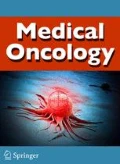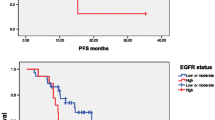Abstract
Epidermal growth factor receptor (EGFR) was expressed widely in NPC. The aim of this study was to investigate the difference of expression of EGFR and Ki67 in primary and recurrence of NPC to supply a micro-evidence of anti-EGFR targeted maintenance therapy for NPC. A retrospective review of 40 patients with clinical stages I–IV b was performed. Chemoradiation was included chemotherapy with fluorouracil plus cisplatin and irradiation for primary and lymph draining regions. All patients were verified tumor locoregional relapse with/or without distant metastasis by CT or MRI after combined CRT by primary and recurrence biopsies. The correlation between EGFR and Ki67 expression inspected by immunohistochemistry was analyzed. The difference of time to recurrence grouped by different expressions of EGFR and Ki67 was compared by log-rank test. The median follow-up time was 20.0 months ± 2.70 (range 23–71). EGFR and Ki67 expression in primary was not significantly different with recurrent focus. A strong significant correlation between EGFR and Ki67 molecules expression was obtained in primary (r = 0.573; P = 0.001) and in recurrent focus (r = 0.698; P = 0.000). A significantly shorter time to locoregional relapse in patients with positive expression of EGFR than patients with negative EGFR expression in primary (P = 0.010) and in relapse (P = 0.022). There was no significant difference of EGFR and Ki67 expression in primary and recurrence tumor expression. The time to relapse was significantly shorter in high expression of EGFR, which might supply micro-evidence to anti-EGFR targeted maintenance therapy for those patients with EGFR overexpression in primary tumor.



Similar content being viewed by others
References
Fandi A, Altun M, Azli N, et al. Nasopharyngeal cancer, epidemiology, staging and treatment. Semin Oncol. 1994;21:382–97.
Lee AWM, Poon YF, Foo W, et al. Retrospective analysis of 5037 patients with nasopharyngeal carcinoma treated during 1976–1985: overall survival and patterns of failure. Int J Radiat Oncol Biol Phys. 1992;23:261–70.
Tan EH, Khoo KS, Wee J, et al. Phase II trial of paclitaxel and carboplatin combination in Asian patients with metastatic nasopharyngeal carcinoma. Ann Oncol. 1999;10:235–7.
Caponigro F, Massa E, Manzione L, et al. Docetaxel and cisplatin in locally advanced or metastatic squamous-cell carcinoma of the head and neck: a phase II study of the Southern Italy Cooperative Oncology Group (SICOG). Ann Oncol. 2001;12:199–202.
Pignon JP, Bourhis J, Domenge C, et al. Chemotherapy added to locoregional treatment for head and neck squamous-cell carcinoma: three meta-analyses of updated individual data—MACH-NC collaborative group: meta-analysis of chemotherapy on head and neck cancer. Lancet. 2000;355:949–55.
Ma J, Mai HQ, Hong MH, et al. Result of a prospective randomized trial comparing neoadjuvant chemotherapy plus radiotherapy with radiotherapy alone in patients with locoregionally advanced nasopharyngeal carcinoma. J Clin Oncol. 2001;19:1350–7.
Zhang L, Zhao C, Peng PJ, et al. Phase III study comparing standard radiotherapy with or without weekly oxaliplatin in treatment of locoregionally advanced nasopharyngeal carcinoma: preliminary results. J Clin Oncol. 2005;23:8461–8.
Al-Sarraf M, LeBlanc M, Giri PGS, et al. Chemoradiotherapy vs. radiotherapy in patients with advanced nasopharyngeal cancer: phase III randomized intergroup study 0099. J Clin Oncol. 1998;16:1310–7.
Chan ATC, Teo PML, Ngan RK, et al. Concurrent chemotherapy-radiotherapy compared with radiotherapy alone in locoregionally advanced nasopharyngeal carcinoma: Progression-free survival analysis of a phase III randomized trial. J Clin Oncol. 2002;20:2038–44.
Rossi A, Molinari R, Boracchi P, et al. Adjuvant chemotherapy with vincristine, cyclophosphamide, and doxorubicin after radiotherapy in local-regional nasopharyngeal cancer: Results of a 4-year multicenter randomized study. J Clin Oncol. 1988;6:1401–10.
Rich JN. Cancer stem cells in radiation resistance. Cancer Res. 2007;67:8980–4.
Liang K, Ang KK, Milas L, et al. The epidermal growth factor receptor mediates radioresistance. Int J Radiat Oncol Biol Phys. 2003;57:246–54.
Jorissen RN, Walker F, Pouliot N, et al. Epidermal growth factor receptor: mechanisms of activation and signalling. Exp Cell Res. 2003;284:31–53.
Argiris A, Heron DE, Smith RP, et al. Induction docetaxel, cisplatin, and cetuximab followed by concurrent radiotherapy, cisplatin, and cetuximab and maintenance cetuximab in patients with locally advanced head and neck cancer. J Clin Oncol. 2010;28(36):5294–300.
Bonner JA, Harari PM, Giralt J, et al. Radiotherapy plus cetuximab for squa- mous-cell carcinoma of the head and neck. N Engl J Med. 2006;354:567–78.
Milas L, Fang FM, Mason KA, et al. Importance of maintenance therapy in C225-induced enhancement of tumor control by fractionated radiation. Int J Radiat Oncol Biol Phys. 2007;67:568–72.
Vermorken JB, Mesia R, Rivera F, et al. Platinum-based chemotherapy plus cetuximab in head and neck cancer. N Engl J Med. 2008;359:1116–27.
Xu XQ, Yu JM, Sun XD, et al. The prognostic value of 18F-fluorodeoxy glucose uptake by using serial positron emission tomography and computed tomography in patients with stage III nonsmall cell lung cancer. Am J Clin Oncol. 2008;31(5):470–5.
Rusch V, Klimstra D, Venkatraman E, et al. Overexpression of the epidermal growth factor receptor and its ligand transforming growth factor—a is frequent in resectable non-small cell lung cancer but does not predict tumor progression. Clin Cancer Res. 1997;3:515–22.
Volante M, Saviozzi S, Rapa I, et al. Epidermal growth factor ligand/receptor loop and downstream signaling activation pattern in completely resected non small cell lung cancer. Cancer. 2007;110:1321–8.
Zheng X, Hu L, Chen F, Christensson B. Expression of Ki67 antigen, epidermal growth factor receptor and Epstein-Barr virus-encoded latent membrane protein (LMP1) in nasopharyngeal carcinoma. Eur J Cancer B Oral Oncol. 1994;30(5):290–5.
Chua DT, Nicholls JM, Sham JS, Au GK. Prognostic value of epidermal growth factor receptor expression in patients with advanced stage nasopharyngeal carcinoma treated with induction chemotherapy and radiotherapy. Int J Radiat Oncol Biol Phys. 2004;59:11–20.
Ma BB, Poon TC, To KF, Zee BMo FK, Chan CM, et al. Prognostic significance of tumor angiogenesis, Ki 67, p53 oncoprotein, epidermal growth factor receptor and HER2 receptor protein expression in undifferentiated nasopharyngeal carcinoma—a prospective study. Head Neck. 2003;25:864–72.
Taheri-Kadkhoda Z, Magnusson B, Svensson M, Mercke C, Björk-Eriksson T. Expression modes and clinical manifestations of latent membrane protein 1, Ki-67, cyclin-B1, and epidermal growth factor receptor in nonendemic nasopharyngeal carcinoma. Head Neck. 2009;31:482–92.
Schmidt-Ullrich RK. Molecular targets in radiation oncology. Oncogene. 2003;22:5730–3.
Kharbanda S, Yuan ZM, Rubin E, et al. Activation of Src-like p56/p53lyn tyrosine kinase by ionizing radiation. J Biol Chem. 1994;269:20739–43.
Gorski DH, Beckett MA, Jaskowiak NT, et al. Blockage of the vascular endothelial growth factor stress response increases the antitumor effects of ionizing radiation. Cancer Res. 1999;59:3374–8.
Pueyo G, Mesia R, Figueras A, et al. Cetuximab may inhibit tumor growth and angiogenesis induced by ionizing radiation: a preclinical rationale for maintenance treatment after radiotherapy. Oncologist. 2010;15:976–86.
Acknowledgments
We thank for Weixia Zhong, director of the department of Pathology, Shandong Tumor Hospital and Institute, for her generous support, and Xiangyu Sun for his technical assistance. We thank Huiqin Li, director of the department of Epidemiology, for his excellent statistic analysis assistance.
Conflict of interest
We declare that we have no financial and personal relationships with other people or organizations that can conflict our study and submission.
Author information
Authors and Affiliations
Corresponding author
Additional information
Yanqin Yang and Jize Xuan are the first co-authors.
Rights and permissions
About this article
Cite this article
Yang, Y., Xuan, J., Yang, Z. et al. The expression of epidermal growth factor receptor and Ki67 in primary and relapse nasopharyngeal cancer: a micro-evidence for anti-EGFR targeted maintenance therapy. Med Oncol 29, 1448–1455 (2012). https://doi.org/10.1007/s12032-011-0028-4
Received:
Accepted:
Published:
Issue Date:
DOI: https://doi.org/10.1007/s12032-011-0028-4




